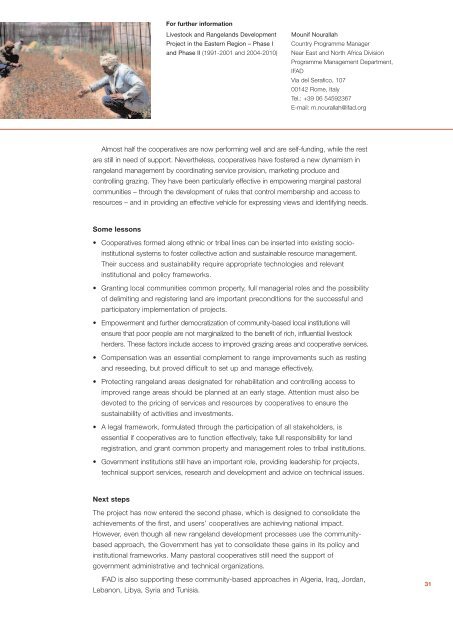Community-based natural resource management - International ...
Community-based natural resource management - International ...
Community-based natural resource management - International ...
Create successful ePaper yourself
Turn your PDF publications into a flip-book with our unique Google optimized e-Paper software.
Almost half the cooperatives are now performing well and are self-funding, while the rest<br />
are still in need of support. Nevertheless, cooperatives have fostered a new dynamism in<br />
rangeland <strong>management</strong> by coordinating service provision, marketing produce and<br />
controlling grazing. They have been particularly effective in empowering marginal pastoral<br />
communities – through the development of rules that control membership and access to<br />
<strong>resource</strong>s – and in providing an effective vehicle for expressing views and identifying needs.<br />
Some lessons<br />
• Cooperatives formed along ethnic or tribal lines can be inserted into existing socioinstitutional<br />
systems to foster collective action and sustainable <strong>resource</strong> <strong>management</strong>.<br />
Their success and sustainability require appropriate technologies and relevant<br />
institutional and policy frameworks.<br />
• Granting local communities common property, full managerial roles and the possibility<br />
of delimiting and registering land are important preconditions for the successful and<br />
participatory implementation of projects.<br />
• Empowerment and further democratization of community-<strong>based</strong> local institutions will<br />
ensure that poor people are not marginalized to the benefit of rich, influential livestock<br />
herders. These factors include access to improved grazing areas and cooperative services.<br />
• Compensation was an essential complement to range improvements such as resting<br />
and reseeding, but proved difficult to set up and manage effectively.<br />
• Protecting rangeland areas designated for rehabilitation and controlling access to<br />
improved range areas should be planned at an early stage. Attention must also be<br />
devoted to the pricing of services and <strong>resource</strong>s by cooperatives to ensure the<br />
sustainability of activities and investments.<br />
• A legal framework, formulated through the participation of all stakeholders, is<br />
essential if cooperatives are to function effectively, take full responsibility for land<br />
registration, and grant common property and <strong>management</strong> roles to tribal institutions.<br />
• Government institutions still have an important role, providing leadership for projects,<br />
technical support services, research and development and advice on technical issues.<br />
Next steps<br />
For further information<br />
Livestock and Rangelands Development<br />
Project in the Eastern Region – Phase I<br />
and Phase II (1991-2001 and 2004-2010)<br />
Mounif Nourallah<br />
Country Programme Manager<br />
Near East and North Africa Division<br />
Programme Management Department,<br />
IFAD<br />
Via del Serafico, 107<br />
00142 Rome, Italy<br />
Tel.: +39 06 54592367<br />
E-mail: m.nourallah@ifad.org<br />
The project has now entered the second phase, which is designed to consolidate the<br />
achievements of the first, and users’ cooperatives are achieving national impact.<br />
However, even though all new rangeland development processes use the community<strong>based</strong><br />
approach, the Government has yet to consolidate these gains in its policy and<br />
institutional frameworks. Many pastoral cooperatives still need the support of<br />
government administrative and technical organizations.<br />
IFAD is also supporting these community-<strong>based</strong> approaches in Algeria, Iraq, Jordan,<br />
Lebanon, Libya, Syria and Tunisia.<br />
31

















